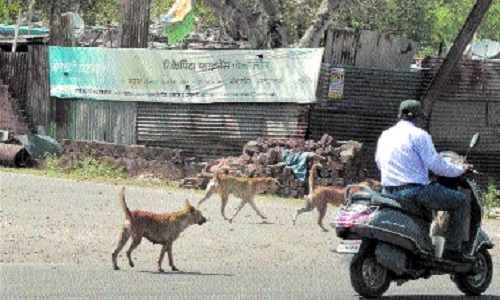Bhopal struggles with rising dog bite cases: Efforts not matching the pace
| Date :14-Apr-2024 |

By Kriti Shah
The State capital continues to grapple with a sharp rise in street dog bite cases, with incidents doubling annually, according to data from various hospitals. The figures are alarming considering the fact that, from over 8,000 cases in 2020 to shocking increase of more than 16,000 cases in 2023, and in just a span of three months as we entered in 2024 till now 6,728 cases have been reported, highlighting the grim situation. Despite the interventions by the Madhya Pradesh Human Rights Commission (MPHRC) and efforts by the Bhopal Municipal Corporation (BMC) under Animal Birth Control Programme, the situation on the ground remains largely unchanged. Recent incidents highlight the severity of the issue, especially its impact on children. In March, a horrifying incident came to light from Ganganagar Colony in Shyamala Hills Police Station area, where a six-year-old child was attacked by stray dogs, resulting in injuries to his teeth and jaw. The child was admitted to Kamala Nehru Hospital for treatment. Earlier in January, a seven-month-old boy was tragically mauled to death by a pack of dogs in Ayodhya Nagar. A viral video of the incident showed the child’s severed hand. According to some reports, following this incident, BMC captured eight stray dogs from Ayodhya Nagar.
However, following these several alarming cases, the BMC’s efforts seems quite inadequate. The BMC Public Relations Officer (PRO), when approached by ‘The Hitavada’ for insights on the issue and details about their standard procedures they have planned in order to address these increasing cases, the PRO avoided answering, citing a busy schedule. On top of that, various incidents revealed that BMC’s approach in handling the street dog menace is more reactive in nature rather than being proactive. Shifting the view from the authorities to the subject experts, the experts pointed out that the changing breeding dynamics due to weather variations could be contributing to the surge in canine attacks. With the State experiencing drastic weather changes, due to unusual thunderstorms and rain received in the month of ‘usually hot’ April, this paradigm shift in climate could be a reason. In general terms, monsoon is considered as the mating season for dogs, showcasing a rise in dog bite cases. However, experts suggest that the reproductive seasonality dynamic has shifted, possibly leading to the recent surge in attacks.
According to the 2019 livestock census, Bhopal is home to over 10,000 stray dogs. Despite spending over Rs 1 crore annually on sterilisation, and carrying out more than 20 sterilisations daily, the dog population continues to rise. The BMC’s ongoing sterilisation programme aimed at controlling the dog population seems ineffective in curbing the growing issue. The recent MPHRC’s intervention, which directed the Chief Secretary and Principal Secretary of the MP Urban Development and Housing Department to investigate the matter, has yet to yield significant results. The Commission’s directive also followed cases happened in Bhopal in 2018 and Khargone in 2016 where authorities were found negligent in managing stray dogs, compromising public safety. According to various sources, the persistent rise in dog bite cases in Bhopal underscores the urgent need for more effective measures by the BMC and concerned authorities. Immediate action is required to ensure the safety of residents, especially children, and to address the growing issue of stray dog attacks in the city.